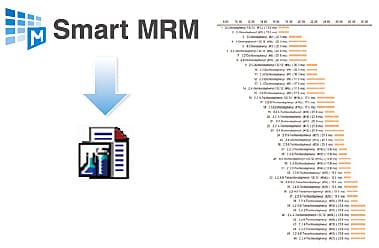Smart Environmental Database - Features
Database for GC-MS and GC-MS/MS
Create MRM Methods for GC-MS/MS

The Shimadzu Smart Environmental Database contains all the information necessary to create MRM methods for over 500 environmental pollutants, including polychlorinated biphenyls (PCBs), brominated flame retardants (BFRs), dioxins, polycyclic aromatic hydrocarbons (PAHs), organochlorine pesticides (OCPs), and stable isotopically labeled compounds that are commonly used as Internal and Surrogate Standards. The database includes up to six fully optimized MRM transitions for all compounds, plus retention indices (RI) for setting correct retention times, CAS numbers, and other compound-specific information.
Optimized analytical methods for each compound class, including the recommended capillary column
and GC oven program, are part of the database package to minimize start-up time.
Smart MRM Optimizes Methods Automatically

The Shimadzu Smart MRM feature allows the user to create fully optimized MRM and Scan/MRM methods automatically. GC-MS/MS Dwell, Event, and Loop times can be difficult to optimize when dozens, or even hundreds of compounds are to be analyzed simultaneously. The Smart MRM feature automatically determines the optimum Dwell, Event, and Loop settings using flexible MRM events, and creates MRM and Scan/MRM methods that provide the best sensitivity for all compounds in a single method.
Accurate Retention Time Update via AART
The Automatic Adjustment of Retention Time (AART) function is a standard feature of all Shimadzu GCMS packages, and allows the user to quickly and easily perform multipoint retention time updates using the fundamental principle of Retention Indices. The Smart Database Series includes RIs for all registered compounds for easy implementation of the AART function.


